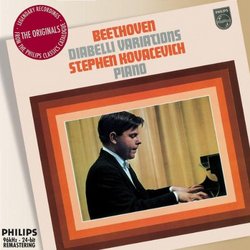| All Artists: Ludwig van Beethoven, Stephen Kovacevich Title: Beethoven: Diabelli Variations Members Wishing: 0 Total Copies: 0 Label: Philips Original Release Date: 1/1/2006 Re-Release Date: 8/8/2006 Album Type: Original recording remastered Genre: Classical Styles: Chamber Music, Historical Periods, Classical (c.1770-1830) Number of Discs: 1 SwapaCD Credits: 1 UPC: 028947575566 |
Search - Ludwig van Beethoven, Stephen Kovacevich :: Beethoven: Diabelli Variations
 | Ludwig van Beethoven, Stephen Kovacevich Beethoven: Diabelli Variations Genre: Classical
|
Larger Image |
CD Details |
CD Reviews"The greatest of all piano works" WHM | Amsterdam | 12/01/2008 (5 out of 5 stars) "...according to Alfred Brendel in one of his essays (Alfred Brendel on Music: Collected Essays). Many will agree that Beethoven's Diabelli Variations are one of the foremost compositions for the piano. In 1821, Anton Diabelli (a Viennese music publisher) approached all the composers he could think of and asked them each to contribute a variation on a Waltz theme of his composition. Diabelli collected nearly 50 names, among them Czerny, Hummel, Liszt (then a 10-year old boy), Schubert and Beethoven. What Diabelli could hardly have conceived: he provoked from Beethoven not one variation but 33. The result? An absolute high point of Beethoven's art. A fantastic demonstration of pure creativity and invention, considering that Beethoven used a rather trivial C major theme as starting material. The work is, in a sense, a big joke at the expense of the poor Diabelli; enormously diverse and full of humor. Var. 16 is remarkably jazzy and reminiscent of the "boogie-woogie variation" of the Op. 111 piano sonata (Beethoven always had a deep interest in the variation form). But after Var. 28, the work moves suddenly into a dark C minor world. The following three variations (Adagio, Andante and Largo) are of increasing beauty and sadness. These are among my favorites. At the end of Var. 31, the music launches into a fugue of great dynamic power, followed by a Minuet of perfect simplicity and a heavenly coda. For those who want to know more about the Diabelli Variations, I recommend a visit to Wikipedia [Diabelli_Variations]; a very informative and helpful source, particularly if you can read music! I'm really surprised to find no commentary here on the legendary recording by Stephen Kovacevich, for this reissue is one of the classic and finest interpretations of the Diabelli. It is a convincing performance of great clarity and vitality (five stars for its time). The remastered sound is very good. Kovacevich, now in his late sixties, was a pupil of Dame Myra Hess and is one of the great Beethoven interpreters (he recorded the complete sonatas). His stage debut (London, 1961) was with the Diabelli Variations, which immediately established him in the top rank. When it comes to the Diabelli, one version can never be enough. A considerable challenge to Kovacevich is Gregory Sokolov. Sokolov's live recording is more idiosyncratic, but comparably fine, very intense and expressive (available from amazon.com.UK). Highly recommended! I also have Serkin and Brendel (his 1988 version) on the shelf, but their renditions are more literal and less lyrical than those by Kovacevich and Sokolov. *UPDATE: Kovacevich's return to the Diabelli Variations after some 40 years has been released by Onyx in January 2009 (Beethoven: Diabelli Variations). I regret to say it's a somewhat disappointing performance. " Kovacevich's Beethoven doesn't disappoint J. Grant | North Carolina, USA | 03/17/2009 (5 out of 5 stars) "I've always considered Stephen Kovacevich to be a remarkable Beethoven player, whether it was the concertos or sonatas. This rendering of the Diabelli Variations is no exception. Aside from Schnabel's 1937 and Arrau's 1952 accounts (with inferior sound), this is surely a top choice. I also like Brendel's live 1976 and Sokolov's, but this one by Kovacevich is the one I return to most often. Great remastered sound." Diabelli with a difference Scriabinmahler | UK | 04/09/2009 (5 out of 5 stars) "I've always loved Richter's towering account on M&A (sadly out of print now), but this warmly expressive account by Kovacevich was a revelation to me. There are many extraordinary recordings of the work, but most of them sounds too laboured and self-concious, taking this music as a sort of huge mountain to climb, that is tiring to listen to.
Kovacevich's account, on the other hand, is very sincere and wonderfully fresh, letting the music speak most eloquently and also bringing Schubertian lyricism in slow variations. Technically he is solid like a rock, and in some variations he surpasses even Richter, not to mention Pollini and Sokolov. This is a pianism of true maturity and stature no serious collector could miss." |

 Track Listings (33) - Disc #1
Track Listings (33) - Disc #1